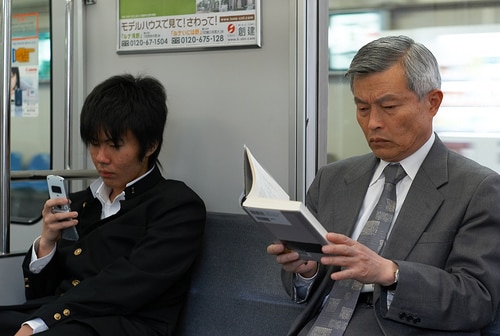I have never been able to pinpoint the timeframes and characteristics of Generations X, Y, and the Millennials. Extensive research (on Wikipedia) has only confused me further. But in China, rigid definitions make it easy to place oneself on the spectrum. “80后” (bā líng hòu) or “after eighty,” refers to people born from 1980-89; similarly, “90后” means people with birthdays in 1990-99.
Such groupings do carry some merit. Over the past thirty-odd years, Chinese society has changed so rapidly that unique generational traits slough off within a decade. Most of my coworkers in Nanjing were 80后, the first generation without siblings, the ones who can recall China’s transition from bicycles to BMWs. Their concerns revolve around finding stable employment, saving up to buy a house, and starting a family. They are fascinated with the West, but I feel that to them, I remain a foreigner first, person second.
My 90后 friends, on the other hand, are not flustered to befriend an expat. Brimming with ambition, these are the students whose applications flood American colleges’ admissions offices by the tens of thousands. In their eyes, opportunity trumps stability. The desire to learn more about the outside world enriched our interactions as we formed deep personal connections.
Yet I still struggle to identify with either group. As a recent graduate trying to find my way, I find myself in the same place in life as my 80后friends, but our world views often clash. Conversely, I have unforgettable philosophical conversations with 90后 pals, yet they still enjoy the shelter of college life, something that now feels alien to me. But the reason for feeling out of place goes beyond my 1989 birthday skimming the chronological border.
A few days ago, I got an email from my friend Minjie, a former intern at the gym I frequented in Nanjing. With Minjie I formed a friendship that immediately felt old and trusted, though at first I did not know why. On the surface, we have little in common: I studied history, Minjie majored in badminton; I live abroad, whereas Minjie has traveled to but a handful of Chinese cities.
In between workouts, we would chat about animal abuse in China, Minjie’s fastidious girlfriend, and the desire to be something more than a 庸人, or “Average Joe.” He has a seriousness to him that our ‘89 peers tend to lack. But other friends have often said the same of me, citing my father’s career in the Navy. When I learned that Minjie’s dad was a police officer, things started to make sense.
Like many quantitative analyses, these generational definitions lack nuance despite the appearance of precision. Maybe it’s just as superficial to claim people get along because their parents held similar occupations. But nothing is as beautiful as finding common ground with someone otherwise very different from oneself. And sometimes, that is all a budding friendship needs.
在美国,我从来不能准确地描写 X代,Y代,与千禧代的特性,也搞不清楚到底这些代是从什么时候开始到什么时候结束。广泛的研究(使用维基百科)只是让我更困惑。相反地,在中国,严格的定义让人很容易就知道自己属于那一个范围。“80后”(八十年代以后)是指1980-1989以内出生的人;同样的,90后是指1990-1999以内出生的人。
这样的分类是有点道理的。在过去的三十年左右,由于中国社会变化非常之快,一代人的特性在十年之内世就随之而变了。在南京,我的同事大部分都是80后的人,是第一代独生子女;他们记得中国从自行车到宝马汽车的过渡。他们主要关心的是找到一个稳定的职业,省钱买房子,成家立业。他们很迷西方,但我觉得对他们来说,我首先是一个外国人,然后才是“人”。
我的90后的朋友是完全不一样的。他们跟外籍人士交朋友一点都不心慌。他们很想出国留学,这些充满野心的学生向美国高校招生办公室递上了成千上万的申请书。对他们来说,机会比稳定更重要。由于他们很渴望了解外界,我们互相之间交往比较多,关系也比较密切。
可是我还是觉得我这两组人都不属于。作为一个还在找出路的刚刚毕业的大学生,我和我的80后的朋友的情况差不多,但是我们的世界观经常有冲突。 相反地,我跟我的90后的朋友很投机,经常有难忘的哲学对话,可是,不象我,他们无忧无虑,还在享受大学的舒适生活。那样的生活对我来说已经是很遥远的记忆了。这种格格不入的感觉不仅是因为我是1989年(80后与90后的边界)出生的。
日前,我收到了我的朋友明杰的电子邮件。明杰以前是在一家我在南京经常光顾的健身房做实习生。不知道什么原因,我们很快就成为很好的朋友。表面来说,我们很不一样。我是学历史的,他是修羽毛球的。我住在国外,他只去过几个中国的城市。
在锻炼之间,我们会谈谈有关中国虐待动物的事,他的挑剔的女朋友,和我们不要成为庸人的渴望。明杰很严肃,跟我其他的1989年出生的朋友不一样。但是我的朋友也常常说我很严肃,他们认为这是因为我父亲是在海军服役的。当我发现明杰的父亲是警察,我才开始明白为什么我和他很相似。
象大多数的数学分析一样,虽然这些世代的定义看起来很精确,但是它们实际上还是无法定义这些微妙的差别。说两个人相处的好是因为他们父母的职业一样可能也比较肤浅,但是能跟自己很不一样的人找到共同点是一种很美好的感觉。有的时候,这正是在萌芽状态的友谊所需要的。


